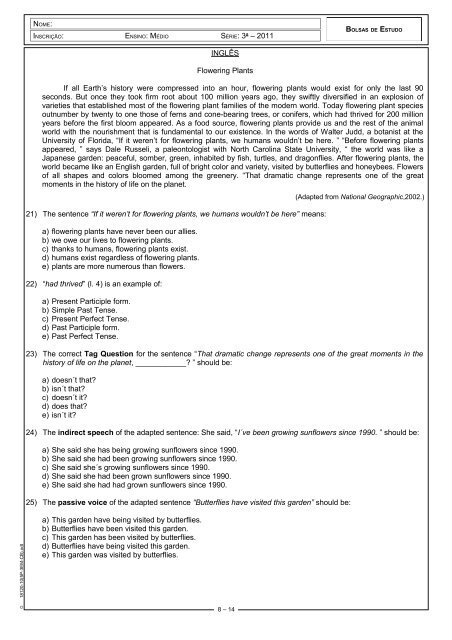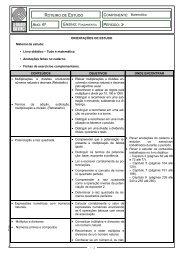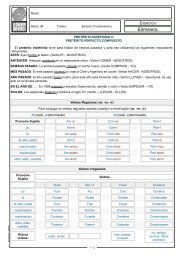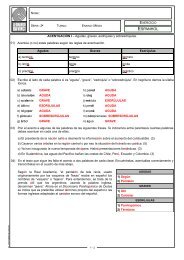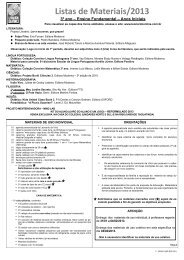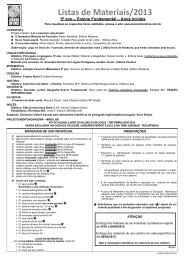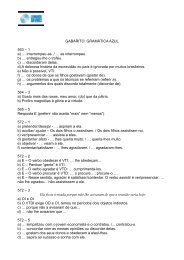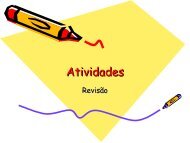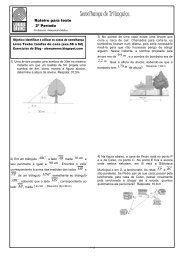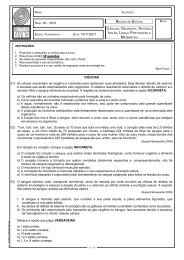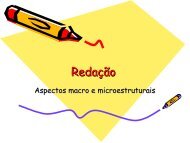Prova da 3ª série do EM aplicada em 2010 - Leonardo da Vinci
Prova da 3ª série do EM aplicada em 2010 - Leonardo da Vinci
Prova da 3ª série do EM aplicada em 2010 - Leonardo da Vinci
You also want an ePaper? Increase the reach of your titles
YUMPU automatically turns print PDFs into web optimized ePapers that Google loves.
18120-10(5P-3<strong>EM</strong>-CB).odt<br />
R<br />
NOME:<br />
INSCRIÇÃO:<br />
INGLÊS<br />
Flowering Plants<br />
If all Earth’s history were compressed into an hour, flowering plants would exist for only the last 90<br />
seconds. But once they took firm root about 100 million years ago, they swiftly diversified in an explosion of<br />
varieties that established most of the flowering plant families of the modern world. To<strong>da</strong>y flowering plant species<br />
outnumber by twenty to one those of ferns and cone-bearing trees, or conifers, which had thrived for 200 million<br />
years before the first bloom appeared. As a food source, flowering plants provide us and the rest of the animal<br />
world with the nourishment that is fun<strong>da</strong>mental to our existence. In the words of Walter Judd, a botanist at the<br />
University of Flori<strong>da</strong>, “If it weren’t for flowering plants, we humans wouldn’t be here. ” “Before flowering plants<br />
appeared, ” says Dale Russeli, a paleontologist with North Carolina State University, “ the world was like a<br />
Japanese garden: peaceful, somber, green, inhabited by fish, turtles, and dragonflies. After flowering plants, the<br />
world became like an English garden, full of bright color and variety, visited by butterflies and honeybees. Flowers<br />
of all shapes and colors bloomed among the greenery. “That dramatic change represents one of the great<br />
moments in the history of life on the planet.<br />
21) The sentence “If it weren’t for flowering plants, we humans wouldn’t be here” means:<br />
a) flowering plants have never been our allies.<br />
b) we owe our lives to flowering plants.<br />
c) thanks to humans, flowering plants exist.<br />
d) humans exist regardless of flowering plants.<br />
e) plants are more numerous than flowers.<br />
22) “had thrived” (l. 4) is an example of:<br />
a) Present Participle form.<br />
b) Simple Past Tense.<br />
c) Present Perfect Tense.<br />
d) Past Participle form.<br />
e) Past Perfect Tense.<br />
(A<strong>da</strong>pted from National Geographic,2002.)<br />
23) The correct Tag Question for the sentence “That dramatic change represents one of the great moments in the<br />
history of life on the planet, ____________? ” should be:<br />
a) <strong>do</strong>esn´t that?<br />
b) isn´t that?<br />
c) <strong>do</strong>esn´t it?<br />
d) <strong>do</strong>es that?<br />
e) isn´t it?<br />
ENSINO: MÉDIO<br />
24) The indirect speech of the a<strong>da</strong>pted sentence: She said, “I´ve been growing sunflowers since 1990. ” should be:<br />
a) She said she has being growing sunflowers since 1990.<br />
b) She said she had been growing sunflowers since 1990.<br />
c) She said she´s growing sunflowers since 1990.<br />
d) She said she had been grown sunflowers since 1990.<br />
e) She said she had had grown sunflowers since 1990.<br />
25) The passive voice of the a<strong>da</strong>pted sentence “Butterflies have visited this garden” should be:<br />
a) This garden have being visited by butterflies.<br />
b) Butterflies have been visited this garden.<br />
c) This garden has been visited by butterflies.<br />
d) Butterflies have being visited this garden.<br />
e) This garden was visited by butterflies.<br />
SÉRIE: 3 a – 2011<br />
8 – 14<br />
BOLSAS DE ESTUDO


